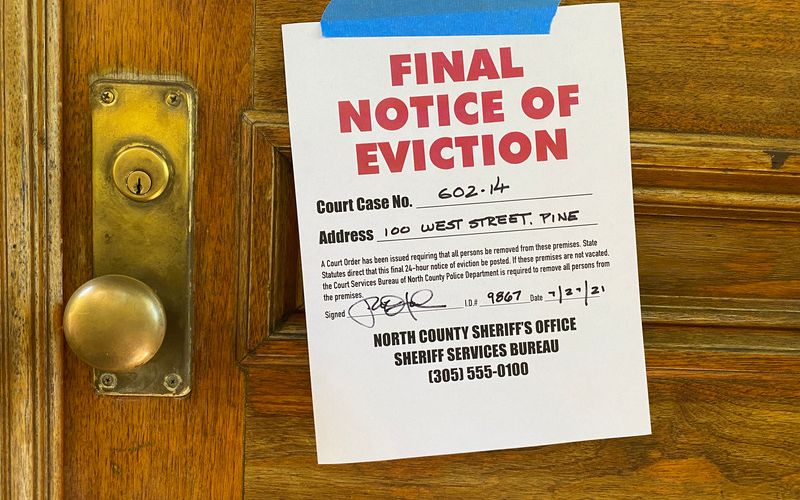Last Updated on March 18, 2024 by Kelvin Nielsen
Having to evict a family member from your property can be a difficult and emotional process. After all, that can damage the relationship you have with them and create a potentially lasting resentment.
That said, that may be the only option you have left. You may have fallen out with them for a myriad of reasons. Including, not sharing the same values and beliefs, financial constraints, or even after a serious life change, such as a divorce or marriage.
Under Connecticut General Statutes Title 47A, evicting a family follows the same rules as evicting a tenant from a property. You cannot try to evict the family member by locking them out, throwing out their belongings, or shutting down their utilities. Doing any of these can get you in legal trouble.
The following is the legal process you must take to evict the family member from your property if they refuse to leave.
How to Evict a Family Member in Connecticut?
#1: Serve the family member an eviction notice.
Specifically, serve them a 30-Day Notice to Cure or Quit. The notice must be in writing and indicate the effective date of lease termination, among other important things. This will give them 30 days to move out of your property.
You must serve the notice properly. For instance, by serving it in person or by posting it on their bedroom’s door.
#2: File an eviction lawsuit in court.
If the family member fails to move out of the property within 30 days, you can go to court and file a lawsuit against them. After successful filing, the court will issue you with a copy of Summons and Complaint and schedule a hearing date.
The Summons and Complaint will provide the tenant with an opportunity to respond to their eviction. If they choose to fight the eviction, they may allege, for instance, that they have a lease with you.
Under CT law, this can happen in multiple ways. That is, through a written document, a verbal agreement, or after exchange of rent. Furthermore, state law also allows guests to acquire full tenancy rights after living in the property for 14 consecutive days in a 6-month period.
#4: Attend court hearing.
The judge will give both you and the family member an opportunity to present your cases. If the judgment is in your favor, you’ll have to request for a Writ of Execution. This will give them only 5 days to move out before a sheriff can forcibly remove them from the premises.
Things to Keep in Mind When Evicting a Family Member in Connecticut
As already mentioned, evicting a family member won’t be easy. It can be incredibly difficult and even take an emotional toll on you. And it goes without saying that you should only consider it as a last resort.
Keep the following in mind when carrying out the eviction.
- Have a conversation with the family member. This might be one of the difficult conversations you’ll have, and it’s likely they will become angry, upset, or hurt.
- Let them know why you’re evicting them. Be clean and concise as much as possible.
- Be respectful and compassionate. Be empathetic about their situation.
- Be prepared to go through the legal system if they refuse to leave on their own. Please note that you cannot carry out a self-help eviction. Such as, locking them out, removing their personal belongings from the unit, or shutting down their utilities. Such actions may even land you in legal trouble yourself.
- Prepare the impact the action will have on other family members.
- Offer to help them find another place to live. You can even help cater for their moving costs and pay for their first month’s rent.
- Give them time to sort themselves out.
Conclusion
Evicting a family member in Connecticut follows the same statewide tenant eviction process. To carry out a successful eviction, you must ensure that you follow every step down to the letter. For expert help, please get in touch with an expert attorney.
If you have a specific question regarding eviction laws for family members, please leave a comment below for expert advice.
Disclosure: The content herein isn’t a substitute for advice from a professional attorney. It’s only meant to serve educational purposes. If you have a specific question, kindly seek expert attorney services.
Sources: Connecticut General Statutes Title 47A, Landlord Responsibilities in Connecticut, When does a Guest Become a Tenant in Connecticut,

Amanda Rose is a seasoned landlord with 13+ years of expertise in overseeing diverse properties. Her adept management spans single and family homes, along with multi-family apartments and condos, across Wyoming and South Dakota. Her commitment and proficiency have cemented her status as a thriving property management professional.
She is a member of the following organizations: Wyoming Landlord’s Association, National Association of Residential Property Managers (NARPM), Wyoming Apartment Association, South Dakota Multi-Housing Association (SDMHA), and South Dakota Landlord Association (SDLA).






